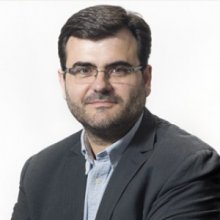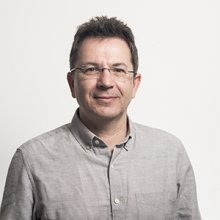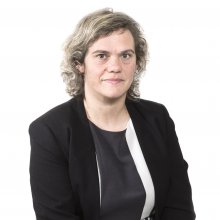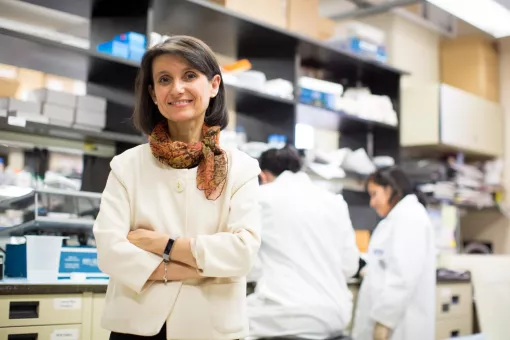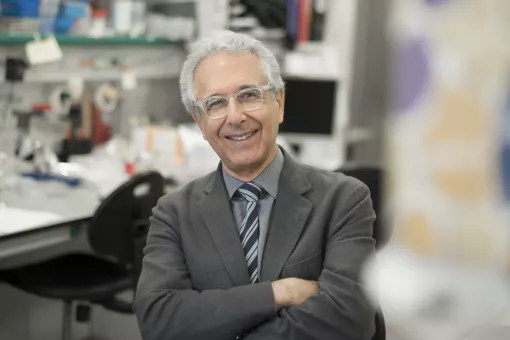Images
On 16 September, the ”la Caixa” Foundation presented the 79 grants for national and international research and innovation projects of excellence—among these four projects from the Institute for Research in Biomedicine (IRB Barcelona).
Among the beneficiaries of funding from ”la Caixa”, IRB Barcelona researchers Eduard Batlle and Raúl Méndez obtained two grants from the call for research projects in biomedicine and health, Meritxel Teixidó received a grant from the CaixaImpulse Programme, and Enrique Marcos was awarded a postdoctoral fellowship.
Characterised by a central theme “Questions for the future”, the awarded projects address questions with the aim to build a better future for society. These are the questions that IRB Barcelona researchers will tackle thanks to this funding.
Can we stop metastasis by interfering with the tumour environment?
Eduard Batlle, ICREA researcher, head of the Colorectal Cancer Lab and a CIBERONC member, aims to develop new therapies aimed at curing patients with metastatic colorectal cancer, a disease that causes around 700,000 deaths a year. The objective of this project is to discover how tumour cells modify their environment to elude the immune system and how they allow the regeneration of the tumour. This research is expected to contribute to the development of new therapies aimed at stopping this tumour cell capacity in patients with advanced colorectal cancer or other types of tumours that use similar mechanisms to evade the action of the immune system.
Can we prevent liver cancer by regulating liver inflammation?
ICREA researcher Raúl Méndez, head of the Translational Control of Cell Cycle and Differentiation Lab, studies how liver cells undergo dramatic changes in their gene expression in response to hypercaloric diets and how these changes can contribute to the development of tumours. In part, these modifications are carried by RNA-binding proteins. The award-winning project aims to unravel the deregulation of these RNA-binding proteins and determine how they affect the inflammation of the liver and the response of the immune system. This knowledge will be used to search for new drugs capable of reversing the effect of obesity on gene expression and will thus contribute to the development of a new generation of drugs against liver cancer.
How can we improve drug delivery to the brain?
The blood-brain barrier is the most important limiting factor for most drug candidates for treating diseases of the central nervous system. Meritxel Teixidó, associate researcher in the Design, Synthesis and Structure of Proteins and Peptides Lab, works on the development of shuttle-peptides that allow drugs to reach the brain. With this CaixaImpulse project, Teixidó intends to advance the preclinical development of one of the compounds with the greatest therapeutic potential for a specific type of pediatric glioma. This product implies a new therapeutic approach for these shuttle-peptides, which deliver the active chemotherapeutic drug to the brain, thus combating this devastating pediatric brain tumour.
How can biology be transformed with designer proteins?
Biological processes are regulated by proteins that can swap between active and inactive states in function of cell requirements and the environment. The project led by Enrique Marcos, a postdoctoral researcher in the Molecular Modelling and Bioinformatics Lab, intends to design small molecule-responsive switches for these proteins. Ligand-binding domains will be tailor-made to link biomarkers in order to develop new biosensors for cancer studies. This multidisciplinary project aims to go beyond the engineering of state-of-the-art protein switches by providing general methods for biotechnological and medical applications.
About IRB Barcelona
The Institute for Research in Biomedicine (IRB Barcelona) pursues a society free of disease. To this end, it conducts multidisciplinary research of excellence to cure cancer and other diseases linked to ageing. It establishes technology transfer agreements with the pharmaceutical industry and major hospitals to bring research results closer to society, and organises a range of science outreach activities to engage the public in an open dialogue. IRB Barcelona is an international centre that hosts 400 researchers and more than 30 nationalities. Recognised as a Severo Ochoa Centre of Excellence since 2011, IRB Barcelona is a CERCA centre and member of the Barcelona Institute of Science and Technology (BIST).


